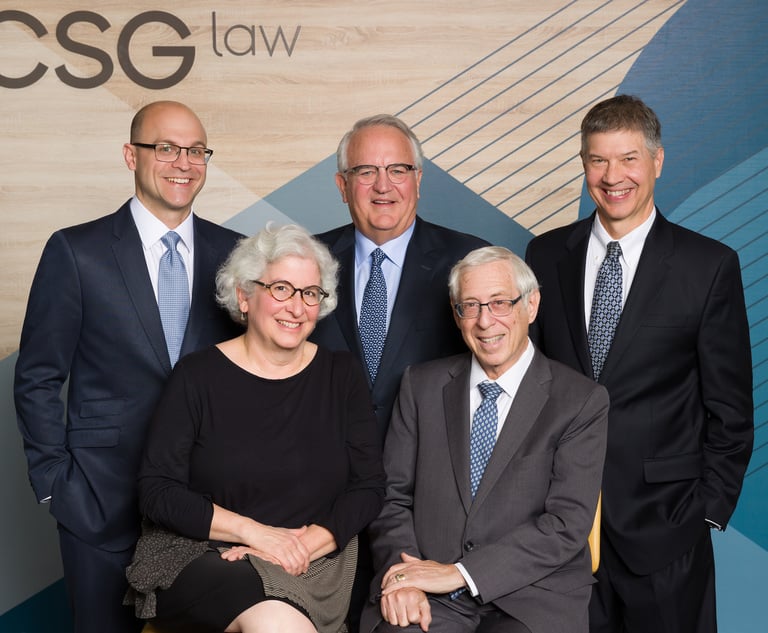 (Photo: freshidea – Fotolia)
(Photo: freshidea – Fotolia)Lopatcong Mayor Can't Unilaterally Appoint Town Attorney, Court Rules
Appellate Division Judges Allison Accurso and Francis Vernoia said that while Lopatcong was organized under the Faulkner Act, which presumes a strong mayoral form of government, all appointments must be made with the advice and consent of the township council.
August 27, 2018 at 05:10 PM
3 minute read
The mayor of the Warren County municipality Lopatcong has lost a battle with the township counsel, as a state appeals court says he overstepped his authority in appointing municipal counsel.
A two-judge Appellate Division panel on Monday said Thomas McKay, though in a “strong mayor” form of government, was not authorized to unilaterally seek to appoint a township attorney to replace a holdover attorney, a labor counsel and a municipal auditor.
Appellate Division Judges Allison Accurso and Francis Vernoia said that, while Lopatcong was organized under the Faulkner Act, which presumes a strong mayoral form of government, all appointments must be made with the advice and consent of the township council.
After taking office as mayor on Jan. 1, 2015, McKay appointed William Caldwell of Carter, Van Rensselaer and Caldwell in Clifton on an interim basis to replace holdover Michael Lavery, of Hackettstown's Lavery, Selvaggi, Abromitis & Cohen; Ryan Carey, of Apruzzese, McDermott, Mastro & Murphy in Liberty Corner to be labor counsel; and Robert Morrison as the municipal auditor.
The council refused to confirm the appointments, and Lavery continued as the municipal attorney.
McKay filed a lawsuit in Warren County Superior Court, claiming he had the authority to make the appointments under the Faulkner Act, and demanded that the Lavery firm repay the township money it was paid while Lavery was acting as a holdover. McKay also asked for counsel fees and costs.
A Superior Court judge granted the council's motion to dismiss the case on summary judgment. The judge said McKay's arguments were “based on an over-simplified and unsupported legal theory that is also based upon a misreading of applicable law,” and an attempt “to provide him with dictatorial powers.”
McKay appealed, but the Appellate Division sided with the township council.
“Neither party can usurp the authority of the other,” the panel said in a per curiam ruling, adding that the Faulkner Act presumes that the mayor and the council will act on a cooperative basis.
On the issue of who would be the municipal attorney, the appeals court turned to a published 1964 Appellate Division ruling, Woodhull v. Manahan.
In Woodhull, the appeals court said “the law is … that until a successor is appointed … the preexisting office holder serves in a holdover capacity.”
The panel also said that McKay apparently invented the position of labor counsel—a position that was not authorized by statute or local ordinance.
Caldwell represented McKay in the litigation. Lawrence Cohen, of Lavery, Selvaggi, issued a statement of behalf of the firm: “We were pleased to see that the court upheld the decision of the lower court that decided that the mayor could not appoint separate counsel without the advice and consent of the council. That was well-settled law.
“The important part of this decision is that where a municipality may have separate attorneys specializing in areas such as labor or tax appeal work, and the municipality appoints one general municipal attorney and separate attorneys for labor and tax, as well as potential other specialties, all of those must be appointed by the mayor with the advice and consent of the council,” Cohen said.
Carey, reached by phone, said he was unaware of the ruling and declined to comment.
The council's attorney, Joseph Bell of Bell & Shivas in Rockaway, did not return a telephone call.
This content has been archived. It is available through our partners, LexisNexis® and Bloomberg Law.
To view this content, please continue to their sites.
Not a Lexis Subscriber?
Subscribe Now
Not a Bloomberg Law Subscriber?
Subscribe Now
NOT FOR REPRINT
© 2024 ALM Global, LLC, All Rights Reserved. Request academic re-use from www.copyright.com. All other uses, submit a request to [email protected]. For more information visit Asset & Logo Licensing.
You Might Like
View All
Chiesa Shahinian Bolsters Corporate Practice With 5 From Newark Boutique
5 minute read
On the Move and After Hours: Brach Eichler; Cooper Levenson; Marshall Dennehey; Archer; Sills Cummis
7 minute read
Construction Worker Hit by Falling Concrete Settles Claims for $2.3M
4 minute read
Eagle Pharma Founder Sues Company to Recoup Cost of SEC Investigation
2 minute readTrending Stories
Who Got The Work
Michael G. Bongiorno, Andrew Scott Dulberg and Elizabeth E. Driscoll from Wilmer Cutler Pickering Hale and Dorr have stepped in to represent Symbotic Inc., an A.I.-enabled technology platform that focuses on increasing supply chain efficiency, and other defendants in a pending shareholder derivative lawsuit. The case, filed Oct. 2 in Massachusetts District Court by the Brown Law Firm on behalf of Stephen Austen, accuses certain officers and directors of misleading investors in regard to Symbotic's potential for margin growth by failing to disclose that the company was not equipped to timely deploy its systems or manage expenses through project delays. The case, assigned to U.S. District Judge Nathaniel M. Gorton, is 1:24-cv-12522, Austen v. Cohen et al.
Who Got The Work
Edmund Polubinski and Marie Killmond of Davis Polk & Wardwell have entered appearances for data platform software development company MongoDB and other defendants in a pending shareholder derivative lawsuit. The action, filed Oct. 7 in New York Southern District Court by the Brown Law Firm, accuses the company's directors and/or officers of falsely expressing confidence in the company’s restructuring of its sales incentive plan and downplaying the severity of decreases in its upfront commitments. The case is 1:24-cv-07594, Roy v. Ittycheria et al.
Who Got The Work
Amy O. Bruchs and Kurt F. Ellison of Michael Best & Friedrich have entered appearances for Epic Systems Corp. in a pending employment discrimination lawsuit. The suit was filed Sept. 7 in Wisconsin Western District Court by Levine Eisberner LLC and Siri & Glimstad on behalf of a project manager who claims that he was wrongfully terminated after applying for a religious exemption to the defendant's COVID-19 vaccine mandate. The case, assigned to U.S. Magistrate Judge Anita Marie Boor, is 3:24-cv-00630, Secker, Nathan v. Epic Systems Corporation.
Who Got The Work
David X. Sullivan, Thomas J. Finn and Gregory A. Hall from McCarter & English have entered appearances for Sunrun Installation Services in a pending civil rights lawsuit. The complaint was filed Sept. 4 in Connecticut District Court by attorney Robert M. Berke on behalf of former employee George Edward Steins, who was arrested and charged with employing an unregistered home improvement salesperson. The complaint alleges that had Sunrun informed the Connecticut Department of Consumer Protection that the plaintiff's employment had ended in 2017 and that he no longer held Sunrun's home improvement contractor license, he would not have been hit with charges, which were dismissed in May 2024. The case, assigned to U.S. District Judge Jeffrey A. Meyer, is 3:24-cv-01423, Steins v. Sunrun, Inc. et al.
Who Got The Work
Greenberg Traurig shareholder Joshua L. Raskin has entered an appearance for boohoo.com UK Ltd. in a pending patent infringement lawsuit. The suit, filed Sept. 3 in Texas Eastern District Court by Rozier Hardt McDonough on behalf of Alto Dynamics, asserts five patents related to an online shopping platform. The case, assigned to U.S. District Judge Rodney Gilstrap, is 2:24-cv-00719, Alto Dynamics, LLC v. boohoo.com UK Limited.
Featured Firms
Law Offices of Gary Martin Hays & Associates, P.C.
(470) 294-1674
Law Offices of Mark E. Salomone
(857) 444-6468
Smith & Hassler
(713) 739-1250






